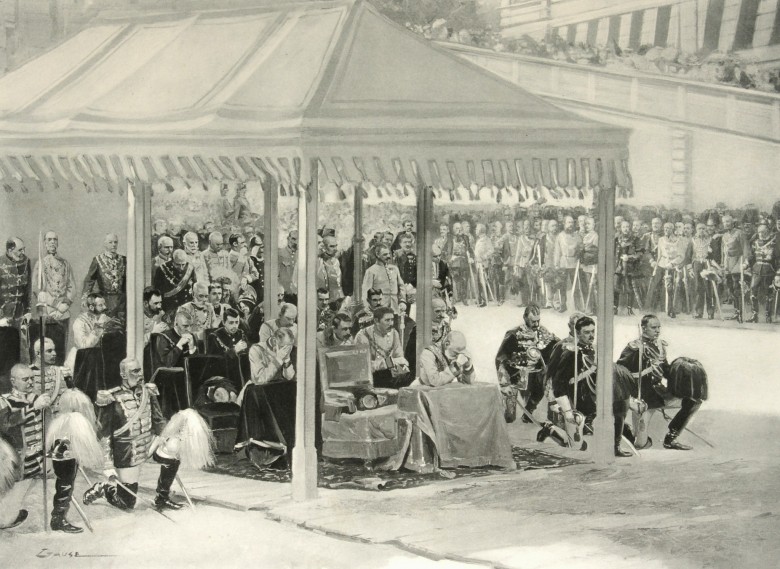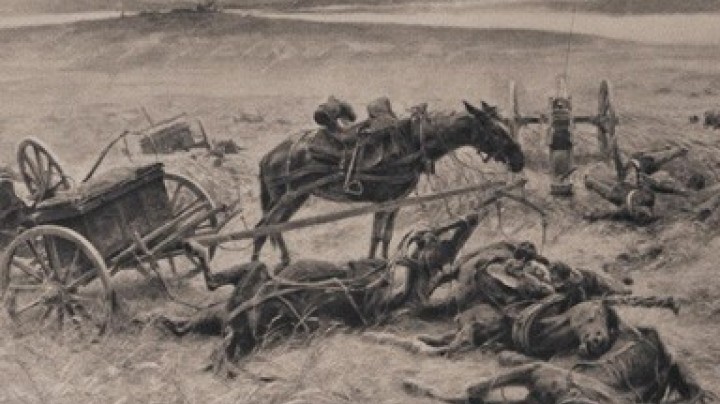The problems and potentialities of a multiethnic state
One of the major challenges for the dual monarchy was the nationalities problem. Franz Joseph’s empire was a multiethnic state in which more than ten languages were spoken and all European religions were represented.
One problem arose from the fact that the various ethnic groups did not have equal opportunities to shape the political process. Following the Compromise with Hungary the Magyars received special privileges alongside the German-speaking elites. This created opposition from the other nationalities, with the ethnic Slav groups in particular feeling disadvantaged. Czechs and Southern Slavs vociferously demanded increased federalization of the Monarchy. The Czechs, who had assumed the leading role among the Slav peoples of the monarchy in the second half of the nineteenth century thanks to rapid economic and cultural development, demanded a position commensurate with their status the third largest nationality within the state as a whole. The hopes of the Czechs were dashed when the ‘Bohemian Compromise’ originally promised by Franz Joseph finally collapsed after opposition from the German-speaking groups in Bohemia in 1871.
Closely connected to the nationalities issue was Austria-Hungary’s Balkan policy. Franz Joseph harboured ambitious plans for expansion in south-eastern Europe, seeing the Balkans as a substitute for the Italian territories he had lost. As the Ottoman Empire continued to decline, new states (Greece, Serbia and Rumania) had emerged during the nineteenth century. The European Great Powers were involved in this process as protecting powers. A huge conflict of interest arose between Austria-Hungary and Russia, which saw itself as the protecting power of the Orthodox Balkan Slavs.
In 1878, in keeping with the resolutions of the Congress of Berlin, the Ottoman provinces of Bosnia and Herzegovina were occupied, although they officially remained part of the Ottoman Empire. These underdeveloped territories were subsequently given the status of ‘Reichsland’ and were administered in common by the Imperial and Royal Ministry of Finance. This expansion of territory also had political consequences for the nationality issue as it resulted in an increase in the (south) Slav ethnic group and thus in the demand of all the ethnic Slav groups for trialism with greater involvement of the Slav majority and an end to German and Magyar domination.
The liberal-led governments had failed to find a solution to the Balkan question. They were followed in 1879 by the conservative government headed by Count Eduard Taaffe (1879-1893). The Taaffe era is notable for its franchise reforms. Through the reduction of the minimum tax base (‘Zensus’) required to qualify for a vote, broader sectors of the population, in particular from the lower middle classes and peasantry, gained a political voice in general elections. This would eventually result in the formation of the modern mass parties of the Christian Socialists and Social Democrats.
The decades after 1867 were marked by progress in the cultural and economic fields. In an era known as the ‘Gründerzeit’, the Habsburg Empire experienced an upswing, with the emergence of new branches of industry and a financially robust middle class. The Monarchy was transforming itself from a feudal agrarian state into an industrial society, even though enormous differences still remained between highly developed and the backward parts of the empire.
Franz Joseph harboured an ambivalent attitude towards this social transformation. The Viennese court remained a stronghold of tradition and was regarded as the most elite in Europe. Although the new middle-class elites and the plutocracy became the representatives and patrons of the city’s cultural life, as symbolized by the Ringstrasse in Vienna, they were not regarded by the court as the equal of the old-established aristocracy.
However, the effect of Franz Joseph as a counterbalancing factor thanks to his personal authority during the latter decades of his reign should not be underestimated. Although he saw himself as a ‘German prince’ and regarded the primacy of German language and culture as the ‘glue’ that held the Monarchy together, in his personal dealings he never allowed even the slightest hint to emerge that he favoured one ethnic group over the other. Franz Joseph represented a pre-modern concept of nationhood and was unsympathetic to the conflicts between the various nationalities that beset his empire.
He also changed considerably in his attitude towards the various religious faiths. Whereas at the beginning of his reign Franz Joseph had represented an extremely reactionary political Catholicism, later on he committed himself to religious pluralism in his Monarchy, although still maintaining the unchallenged primacy of the Catholic Church. He regarded the other religious groups in his realm with benevolence; Jews and Muslims in particular saw him as a protector.
During the boom years in the decades leading up to the turn of the century conditions in the Monarchy were stable, if not always free of tensions. Beneath the calm surface, however, unsolved social problems and political conflict between the various ethnic groups began to ferment.
















